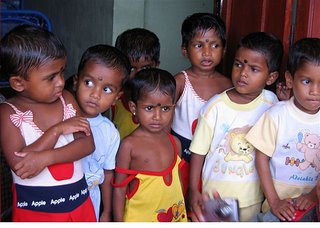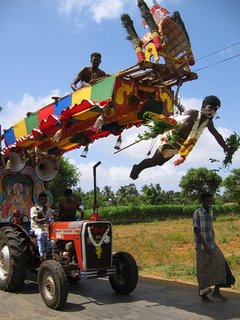ரொரன்ரோவில் இருந்து வெளிவரும் ரொரன்ரோ ஸ்ரார் [Toronto Star] நாளேட்டில் ஈழத்தமிழர்கள் பற்றி வெளிவந்த செய்தியை இங்கே பதிகிறேன். நன்றி.
Young Canadian Tamils find themselves heartsick over the 20-year conflict back in their homeland
Aug. 27, 2006. 01:00 AM
SURYA BHATTACHARYA AND THULASI SRIKANTHAN
STAFF REPORTERS
The civil war that continues to wrack Sri Lanka is older than some Tamil Canadians who closely follow the carnage in the land of their birth.
Conflict along ethnic lines between the Sinhalese forces of the government and the Tamil minority has raged in the tiny island nation for more than 20 years.
"We've only known civil war since we were children," says Ashwin Balamohan, a member of the Canadian Federation of Students at the University of Toronto.
But these first-generation Tamil Canadians also know life in Canada, with itsaccess to education and jobs and, most of all, an environment of law and order.
"What people forget, despite all the opportunities North America presents to you, there's a part of us that is Sri Lankan," says Jana, 27, who did not want her last name used.
Many young Tamil Canadians maintain a deep attachment to Sri Lanka.
"Even though we have moved here, we haven't changed," says high school student Mayuran Balasingam. "Our roots and families are over there."
Following a joint RCMP-FBI investigation, seven Canadians were arrested recently in the United States and Canada on charges of conspiring to buy weapons for the Liberation Tigers of Tamil Eelam, or Tamil Tigers, which both Ottawa and Washington have labelled a terrorist group.
Two of the accused, Suresh Sriskandarajah and Sathajan Sarachandran, were members of an Ontario student delegation that travelled to parts of Sri Lanka soon after the disastrous Boxing Day tsunami struck in 2004.
Sriskandarajah, who was born in Sri Lanka and moved to Canada with his family in 1989, had also visited his homeland the year before and his website is peppered with beautiful photos from the trip, none of which hint at the conflict, and reminisces of a childhood that seemed almost idyllic.
But in the wake of the tsunami, his observations were markedly different.
"The lack of aid in the northeast bothered me to a great extent," he wrote for a Tamil website. "I did not see much coming from outside during the two weeks I was there."
He revisited an orphanage where he'd spent time on his first trip and was devastated to find of the 170 children, only 30 had survived.
U.S. court documents allege that Sriskandarajah later asked three students to smuggle materials including night-vision goggles and Sparton compasses into Tiger-controlled territory.
Sarachandran was president of the Canadian Tamil Students' Association during the delegation's post-tsunami trip to Sri Lanka and expressed similar dissatisfaction with aid distribution.
Jana is from Waterloo, where at least four of the accused went to university.
"It would change you," she says. "Especially those guys who went during the tsunami, and saw what was happening."
But Balamohan emphasizes that taking up arms is not a popular choice in the community.
And although Jana agrees that she doesn't believe in strife as a means to the creation of a homeland, she adds: "I am sure if I go there, I would walk away completely changed."
Mostly, Balamohan says, young Tamils are frustrated at Canadians' lack of understanding of the situation in Sri Lanka.
"When the Holocaust happened, when Rwanda happened, we called it a failure of humanity," he says. "There is a general recognition that the world shouldn't sit back and let them occur. These things are happening in Sri Lanka and that's why we should care."
The conflict has left 60,000 people dead in a country with a population of about 20 million people, about 74 per cent of whom are Sinhalese.
On Friday, the UN's World Food Program estimated that the fighting has forced at least 204,000 people from their homes in the eastern and northern parts of the island.



